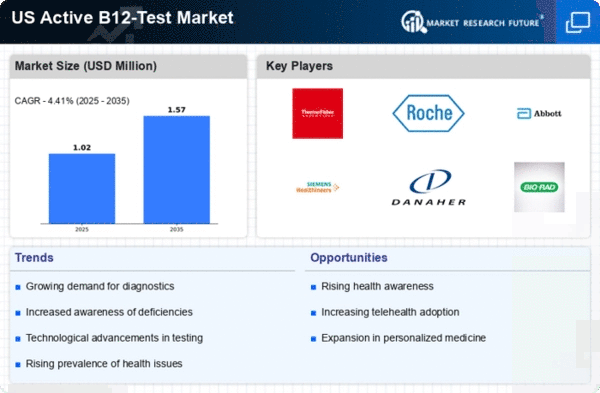Rising Geriatric Population
The active b12-test market is poised for growth due to the increasing geriatric population in the US. As individuals age, the risk of vitamin B12 deficiency escalates, primarily due to factors such as decreased absorption and dietary changes. The US Census Bureau projects that by 2030, approximately 20% of the population will be aged 65 and older, creating a substantial market for B12 testing services. Healthcare providers are likely to focus on this demographic, emphasizing the importance of regular testing to prevent complications associated with deficiencies. This demographic shift presents a significant opportunity for the active b12-test market, as tailored testing solutions become essential for managing the health of older adults.
Integration of Advanced Technologies
The active b12-test market is witnessing a transformation due to the integration of advanced technologies in testing methodologies. Innovations such as high-throughput screening and automated analysis systems enhance the accuracy and efficiency of B12 testing. These technological advancements not only streamline the testing process but also reduce turnaround times, making it more convenient for healthcare providers and patients alike. The market is projected to grow as these technologies become more accessible and affordable. Additionally, the incorporation of artificial intelligence in data analysis may further improve diagnostic capabilities, allowing for more personalized healthcare solutions. As a result, the active b12-test market is likely to benefit from these advancements, attracting both healthcare professionals and patients seeking reliable testing options.
Growing Demand for Diagnostic Testing
The active b12-test market experiences a notable surge in demand for diagnostic testing services. This trend is driven by an increasing prevalence of vitamin B12 deficiency, which affects a significant portion of the population. According to recent data, approximately 6% of adults in the US are estimated to have low levels of vitamin B12, leading to a heightened need for effective testing solutions. As healthcare providers emphasize the importance of early detection and management of deficiencies, the active b12-test market is likely to expand. Furthermore, the rising awareness among consumers regarding the health implications of vitamin deficiencies contributes to this growing demand, prompting more individuals to seek testing services to ensure optimal health outcomes.
Expansion of Health Insurance Coverage
The active b12-test market is benefiting from the expansion of health insurance coverage for diagnostic tests. Recent policy changes have led to increased reimbursement rates for vitamin B12 testing, making it more accessible to a broader population. As insurance providers recognize the cost-effectiveness of early detection and treatment of deficiencies, more individuals are likely to seek testing services. This trend is particularly relevant in the context of rising healthcare costs, where preventive measures can mitigate long-term expenses. Consequently, the active b12-test market is expected to grow as insurance coverage expands, encouraging more patients to utilize testing services as part of their routine healthcare.
Increased Focus on Preventive Healthcare
The active b12-test market is significantly influenced by the growing emphasis on preventive healthcare measures. As individuals become more proactive about their health, there is a rising trend towards regular health screenings, including vitamin B12 testing. This shift is supported by healthcare policies that advocate for preventive care, aiming to reduce long-term healthcare costs associated with untreated deficiencies. The market is expected to expand as more healthcare providers incorporate routine B12 testing into their preventive care protocols. Furthermore, educational campaigns aimed at informing the public about the risks of vitamin deficiencies are likely to drive demand for testing services. Consequently, the active b12-test market is positioned to thrive in an environment that prioritizes preventive health strategies.

















